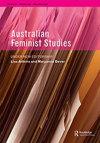Reading Group as Method for Feminist Environmental Humanities
IF 1.5
4区 社会学
Q2 WOMENS STUDIES
引用次数: 0
Abstract
This article argues that reading groups are a collective field building and research method in Feminist Environmental Humanities, an interdisciplinary scholarly area at the intersections of feminist social justice and environmental concerns. We begin by historicising three Australian Feminist Environmental reading groups (COMPOSTING Feminisms, Eco Feminist Fridays, The Ediths) within a longer feminist tradition, then demonstrate how they respond to declining research funding in the neoliberal university and accelerating ecological crisis. Drawing on survey data, we first thematically code and analyse the results to categorise the groups’ functions and impacts. Departing from more traditional data analysis, we then develop a method of interpretation called ‘transversal poetics’. Via a captioned photo essay, we unpack how transversal poetics yields new ways of reading the data. We show how this practice-led, creative method reveals additional themes and crystallises the reading groups’ key ethos: building situated communities of care across difference. Overall, the research underscored that while never free of ethical tensions and compromises, Feminist Environmental reading groups can be a playful, affirmative and generative method for field building and research.读书会作为女性主义环境人文学科的学习方法
本文认为,读书会是女性主义环境人文学科的一种集体场域建构和研究方法,是女性主义社会正义与环境关怀交叉的跨学科学术领域。我们首先将三个澳大利亚女权主义环境阅读小组(堆肥女权主义,生态女权主义星期五,编辑)在更长的女权主义传统中历史化,然后展示他们如何应对新自由主义大学研究经费的减少和加速的生态危机。根据调查数据,我们首先对结果进行主题编码和分析,对群体的功能和影响进行分类。从更传统的数据分析出发,我们开发了一种称为“横向诗学”的解释方法。通过一篇配图文章,我们揭示了横向诗学是如何产生阅读数据的新方法的。我们展示了这种以实践为主导的创造性方法如何揭示其他主题,并使阅读小组的关键精神具体化:建立跨越差异的关怀社区。总体而言,该研究强调,虽然从未摆脱伦理紧张和妥协,但女权主义环境阅读小组可以成为实地建设和研究的一种有趣,肯定和生成的方法。
本文章由计算机程序翻译,如有差异,请以英文原文为准。
求助全文
约1分钟内获得全文
求助全文
来源期刊

Australian Feminist Studies
WOMENS STUDIES-
CiteScore
2.50
自引率
0.00%
发文量
7
期刊介绍:
Australian Feminist Studies was launched in the summer of 1985 by the Research Centre for Women"s Studies at the University of Adelaide. During the subsequent two decades it has become a leading journal of feminist studies. As an international, peer-reviewed journal, Australian Feminist Studies is proud to sustain a clear political commitment to feminist teaching, research and scholarship. The journal publishes articles of the highest calibre from all around the world, that contribute to current developments and issues across a spectrum of feminisms.
 求助内容:
求助内容: 应助结果提醒方式:
应助结果提醒方式:


